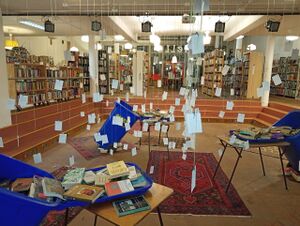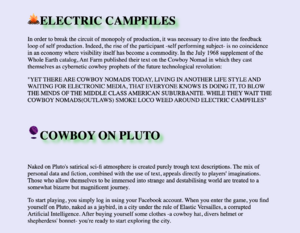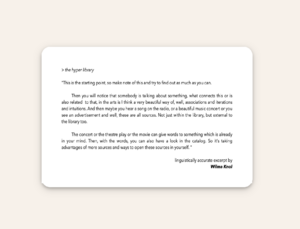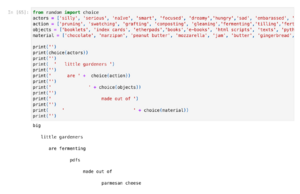Special issue 19: Difference between revisions
No edit summary |
No edit summary |
||
| Line 1: | Line 1: | ||
<div style="font-family:Menlo; font-size: | <div style="font-family:Menlo; font-size: 12px;"> | ||
[[File:Garden leeszaal.jpg|thumb|the workshop]] | [[File:Garden leeszaal.jpg|thumb|the workshop]] | ||
''garden leeszaal'' | ''garden leeszaal'' | ||
Revision as of 00:23, 3 April 2023
garden leeszaal
was a momentary snapshot of the state of a library seen through the metaphor of gardening; pruning, gleaning, growing, grafting and harvesting. garden leeszaal was an open conversation; a collective writing tool, a cooperative collage and an archive. we asked participants to think of the library as a garden. for us, being a gardener meant caring; caring for the people and books that form this space.
📕 pad collection
☞ one: tasks of the contingent librarian
𓇬 special issue
dear diary, today we took some notes on notes. i take notes on my phones notes, notion, and my own personal groupchat i have on whatsapp with myself. we talked about libraries as ideology, as a verb. we picked cards from tasks of the contingent librarian that resonated with us. then talked about them, then walked about what we talked about and transcribed what we heard.
me and irmak: a reader who downloads is a passive reader, we related to the idea of multiplying form, people annotating on things also adds to a text. Also the idea of open-sourcing, assuming that knowledge is private property. It's not going to be the same things when you share you notes with me because I'm a different person, it's not that, knowledge is fluid. Skimming/scanning: what's the difference?
𓇬 prototyping
breadcube setup, keywords: sandbox, raspberry pi, server, unix-like software, post-PRISM age (surveillance program). Sandbox:
- Spaces for testing and prototyping software and describe how users and processes can be isolated for security purposes.
- Debian = OP most often used for servers, or computer without a graphic interaction (only terminal). UTF8 = character encoding
ssh ada @145.24.139.110
wall message
pwd (home)
ls (listing command)
apt intall nginx(install engine sever to access files from the server)
cd var/www/html
nano ada.html
(exit cntrl x)
http://145.24.139.110/ada.html
<a href="suzan.html".suzan,/a>
(to write)
figlet -f /usr/share/figlet/script.flf MESSAGE
ls /usr/share/figlet/
figlet -f shadow ada
- Root = main user
- Pseudo but not root: pseudoappinstall (will work if ur not root)
𓇬 methods
ursula le guin, read in class. crazy read, been reading her fantasy work for years but never saw this.
- she unnames them = the process of naming in the text as gifting and unnaming as giving back a "useful gift" that does not serve something/someone well anymore. the agency of naming oneself, how giving yourself a name can be empowering like the yaks named themselves and how it became so redundant.
- the author of the acacia seeds = the scientists in the text being referred to as linguists and literary experts rather than translators and interpreters, removing the human layer of meaning from animal language.
- the carrier bag theory of fiction = If it is a human thing to do to put something you want, because it's useful, edible, or beautiful, into a bag, or a basket, or a bit of rolled bark or leaf, or a net woven of your own hair, or what have you, and then take it home with you, home being another, larger kind of pouch or bag, a container for people, and then later on you take it out and eat it or share it or store it up for winter in a solider container or put it in the medicine bundle or the shrine or the museum, the holy place, the area that contains what is sacred, and then next day you probably do much the same again--if to do that is human, if that's what it takes, then I am a human being after all. Fully, freely, gladly, for the first time.
- carrier bag library: A bag where people add as much as take away, where the mastery of knowledge is less important than the sharing of information, mutual knowledge, Leeszaal (no checkout, relationship built on trust and knowledge not seen as private propriety) Within a society of surplus, book donation makes sense
☞ two: print screen
𓇬 special issue
relflections on the carrier library, index cards making and opening up texts: i make card for labelling. we annotate again. i hate transcribing. we annotated a video. much nicer not literal.
then we go to XML and bootleg library to find text, make notes, read them out loud, record audio, run vosk-transcriber on it and make plain text.
𓇬 prototyping
Hub: https://pzwiki.wdka.nl/mediadesign/HUB
Hidden network main notes: xvm(xpub virtual machine) is the only publicly reachable server on the network (so if u need to see a page like from the bootleg library, you ask for the bl server to serve the main page of the software used). Basically the request goes from a laptop to
laptop—> xvm —> bootleg —> xvm—→ laptop
- XVM is the only one that has a domain name (xpub.nl, the rest is unreachable without xvm)
Tinc
- Software that makes these hidden networks
- Installing to add breadcube to the HUB
Shell Cheat Sheet
☞ three: text, TBC
𓇬 special issue
visit to the research station and kunstkelder @ Wdka with Wilma Knol, the atlas of new librarianship(expressing social roles of libraries and librarians in diagrams of data triples). bootleg library provides texts thank you bootleg library. we go to the kunst kelder, record the interview and take notes.
𓇬 prototyping
jupyter & hypertext HTML&CSS editing
- hyperworld hypertext edit
HTML details about header, title and language processing
<!DOCTYPE html> tells me it's html
<html>
<head>
<title> needs to be in head not body
<style>
h1{
color: red;
}
</style> css is in the head for everything or can be used for specific parts
<h1 class="" style="color:blue;">text</h1> this way it's both the whole text and h1
𓇬 methods
we use the section of wilma's audio recording about the box with the garden inside and make the recording legible in groups. me and cara make a website with one card. half of it is text i selected and half audio of the spaces between her words. i made the website. here it is ------>
☞ four: scribes getting personal
𓇬 special issue
a day at varia = midwifery of thought, communication tools (for boxes of cards), me and cara take the digital hypertext approach. why gardening? how can we plant the text from wilma at varia? how to nurture seeds for a new environment. using pandoc and weasyprint to make cards! very fun!!
(permacomputing)
mkdir pandoc && cd pandoc
touch foo.html
touch style.css
touch makecards.sh
#! /bin/sh
pandoc --pdf-engine=weasyprint -c style.css -s foo.html -o foo.pdf
chmod a+x makecards.sh
./makecards.sh
-------------
new commands we saw today: touch,create a file chmodchange mode (set permissions for users, groups) to make files readable (r), writeable (w) or executable (x)
𓇬 prototyping
SVG, CSS and HTML continued
Making cards, how to have a different web and print page
@media screen{
body{
background-color:beige;
}
section{
display: flex;
flex-flow: wrap row;
}
div.card{
flex: 1 200px;
background-color: beige;
border: 3px solid white;
margin: 10px;
padding: 10px;
}
div.card:nth-of-type(3n) {
flex: 2 300px;
background-color: darkseagreen;
}
div.card:hover{
background-color: cornflowerblue;
}
}
@media print{
@page{
size: A5 landscape;
margin: 10mm 25mm;
}
h1{
display: none;
}
div.card{
color:blueviolet;
page-break-after: always;
}
}
☞ five: gardening the library
𓇬 special issue
a day at varia with simon: seeds, seeds as heritage; regenerative; libraries as a community garden; seeds as a way to cultivate your homeland elsewhere; seeds are coming home...; seeds as generation... re-generation; ancestral seeds-food archaeology. gardening the library = proof of concepts, materialise. one game using playing cards? defining concepts (cutting, fermenting, growing, weeding). differently.
𓇬 prototyping
hello python! house of dust and generating HTML cards.
house of dust is a computer generated poem by alison knowles. introduction to python and then making our own version of her artwork. introduction to git. don't get git, python is very satisfying but scary. i love it.
𓇬 methods
tex ritter, the dec of cards. we talk about the book utopia, about languages, belief systems. the catalogue of shipwrecked books. take snippets of text and use python to generate a template for them, html and css were made too.




